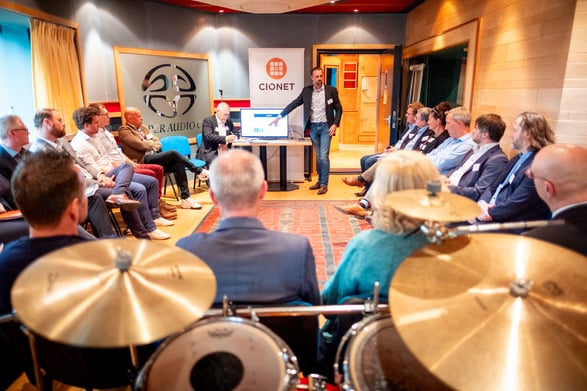Explore the key insights and highlights from the 'Get Your Data Driver's License' workshop, which was part of CIONET's Summer Festival on August 31, 2023. In this summary, we'll delve into the key highlights and takeaways from the workshop.
Bart Moens (Cognizant)
- Data Governance is key in the growth of the data platform.
- Data Stewards to safeguard the confidence by the organisation in the data and prove the value of the data. Visualise the value generated by the data and the contribution of data in the different solutions.
- Describe data sources in a transparent way for end users according to different parameters
- Marketplace to connect end users of the data with the data.
- Sources in an organised way.
Laurent Mons (Proximus)
- Data Governance to be compared with the Break for a car (How quick can a car go without break?).
- Data Governance allows you to go faster - Data Governance allows you to operate your data functions in a more effective way. It must provide clear value for data workers.
- Data Governance starts with the business case and is the job of Data Stewards - Common ground: Data quality & definition of investment depends on Business Case.
- Compliancy: Offensive use case ex. AI is a more offensive use case, what with privacy? Difficult to find balance.
- In compliance, Data Governance must provide a factual description of the processing activity which is understandable by Legal so that they can perform their legal assessment.
- 2 Tips:
- It is easy to fill an empty space (bringing a solution for which there is a need)… so start with these use cases while doing in parallel more complex use cases where the beneficiaries are not the ones having to provide the effort.
- Be sexy, don’t talk of data governance as such. No one wants to be governed. Data is cool!

Joachim De Rouck (Brussels Airport)
- DataWarehouse is too expensive, there is not enough ROI for the usecases.
- Former way of working was to build solution for every problem that arises-> resulted in huge Run Cost, multiple single points of failures as specific knowledge is in the heads of single people due to their history, and increased build cost as there are no accelerators to be used.
- Start from scratch: Analyse the demand, make sure to identify the need and not the desired solution, analyse the data source to identify reuse or quick wins on top of the actual demand and put logic from the beginning (shift left). Put the data in one place based on the same logic which is managed by a Product Data Owner. Data pipelines per data product integrated via a central integration layer leads again to central integration. Data is accessible by all users (via catalogue) and implementation takes very little time. Doing it this way our data increased by 40% but the cost was the same as before.
- Governance: Glossary is a pain. Solution is to use solution leads who understand the business, their processes and knows the available data, combined with technological leads who are expert in specific AI technologies and can inspire for new data cases.
- Data team is not part of IT but is a business department with a central DATA Budget. No issue that departments can’t solve their data problem due to the fact that the respective department doesn’t have a budget anymore. So we can always pick those cases that have most RoI.
Davio Larnout (Radix):
- It takes time. I've seen that reaching a point of momentum took between 3 and 5 years of decisive and disciplined actions while working in iterations with a clear goal.
- Data is a "byproduct" of business and technological "raw material". This means it requires both business and technology understanding to harvest it. For someone in business, the tech is often not a focus, and vice versa. The successful organisations I've seen have adopted a role to bridge that gap: data citizen, data product owner, data steward, etc...
- The technology needed is still maturing and changing quite fast. As a result, companies need to develop flexible architectures and budgets. For example, five years ago, vector databases were not known by most people. Nowadays, because of the advent of AI and Large Language Models (that generate vectors), vector databases will be a key component of a modern data stack.
Interaction from:
- Mercedes Benz: To Joachim. Did you involve discussions with ex. Lufthansa.
- Bridgestone.
- J&J Medtech: How to overcome the problem to misinterpret your clinical data.
- Stefanini group: involved in the medical data environment.
- De Lijn.
- DPD: Have a datateam, Data is a product, data is a cost. Data product owner is the way forward.
- IMEC.
- Vivaldis.
- Serco.
- Digitalis.
- SW AG.
- Zespri.
Conclusion:
- Most of the participants recognised the elements that the speakers presented. All agreed the importance of the USE CASE and the DATA that interacts with the USE CASE.
- My personal question: How to push the organisations to better understand their need and more important their Business case. Is the DATA PRODUCT OWNER the way forward?
.png)

No Comments Yet
Let us know what you think